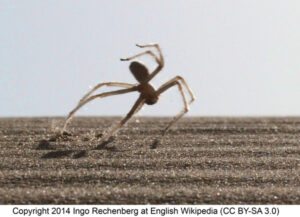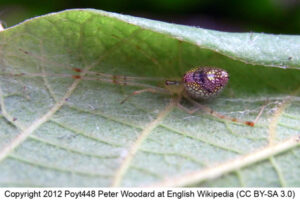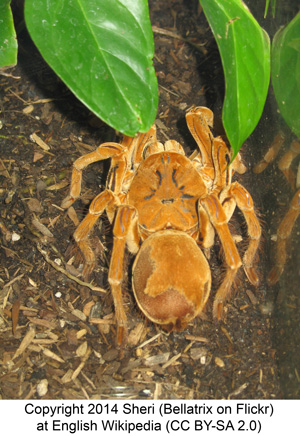Spiders: Scary and Spectacular!
For some, the concept of finding any type of spider in their room makes them want to torch the house, while for others it is a complete love affair with those amazing arachnids.
There are so many fascinating variations of the species, even bordering on the magical. Let’s take a look at the incredible sights and skills of these creepy critters…

Acrobatics
We all know that spiders are master crafters of weaving webs and hanging from the ceiling, but some of these creatures have even more abilities.
The hilarious-sounding Flic-Flac (Cebrennus rechenbergi) spider has a very unique way to get away from dangerous scenarios, by cartwheeling! This spider can move forward at 2 metres per second which is pretty energetic for such a little creature, especially as it lives in the Moroccan desert and has been known to somersault up sand dunes. This little fellow has also inspired a robot design due to its crazy movements!
Spiders from the Selenops genus have the startling ability to glide and can even parachute down from tropical trees. These creatures will stretch their legs out and steer themselves in mid-air to control their descent and landing, which sounds both astounding and terrifying if you happen to be walking beneath the tree canopy during these spiders’ retreats! However, thankfully these spiders typically reside in the tropical forests of Panama and Peru so you are fairly unlikely to encounter these aerial experts on an ordinary nature ramble. Phew.
Fashion show!
All creatures in the animal kingdom love to show off their beauty, especially for mating rituals, and arachnids are no exception. Of course, spider attractiveness is rarely appreciated by us humans but some species are just too stunning to ignore.
Located in Asia and Oceania, the Peacock (Maratus volans) spider is as eye-catching as you can imagine. The radiant colours and patterns on its body are simply gorgeous and definitely refer to its animal namesake – the bright feathered bird. There are many different types of this spider but the males all sport a distinctive colourful flap that they raise like a peacock’s fan tail during courtship displays. On top of this impressive exhibition, these spiders also love to show off their fantastic dance moves to impress the females. If you have got it then flaunt it!
The Mirror or Sequined spider (Thwaitesia argentiopunctata) is also a creature of extraordinary beauty, Adorned with reflective scales, this spider looks truly magical like a mosaic work of art! The reflective quality of their bodies is actually formed from guanine within their digestive system and it works as an effective camouflage against predators. It is even said that one may actually be able to see their reflection in their bodies, although they are pretty tiny only measuring up to 4mm – making them tiny jewelled beings!
Superpowers
Some spiders even surpass the normal skills of arachnids and can perform remarkable talents to enable them to catch their prey.
We assume that most spiders can’t survive excessive water but the Diving bell spiders (Argyroneta aquatica) have an astonishing way in which to breathe underwater – by creating an air bubble around themselves! They use this technique to stalk and capture their prey and then trap them within the bubble as they devour their meal. Pretty brutal. These spiders spend the majority of their time beneath the surface and their air pockets can even last for more than a day so they can remain submerged. Therefore they are effectively known as water spiders and, at only 10-15 mm in size, use vegetation to create their very own little underwater nests. If it wasn’t for their quite painful bite, they might be kind of sweet.
The Funnel-web spider (Hadronyche and Atrax) is given this name due to the shape of its web and tunnel-shaped hideaway lair, and can definitely be considered a super-spider! They create their habitat by burrowing into sheltered areas, such as rotting logs, under rocks, etc., and then create a series of trip wires over and around the entrance that alert them to any trespassing insects that will make a tasty meal. These silken lines can also warn the spider of any potential danger or even passing mates which is certainly a useful feature to have from within their safe and dampen refuge. When they are hunting for food and become aware of said intruder, they quickly leap into action and rush from out of the entrance of their home to grab hold of the unsuspecting victim subduing them with their poisonous fangs. Not only is this a terrific form of meticulous planning and super speed, but they also have a deadly venom that can kill humans in only 15 minutes!
Just weird
Now, we have looked at the marvellous things that spiders can do but sometimes there are just plain weird behaviours of these confounding creatures.
The aptly named Bird Dung Crab spider (Phrynarachne ceylonica) uses its spidey skills to literally disguise itself as a blob of bird poo…nice. The method behind this madness is that it attracts insects with a faecal appetite as well as forming protection from predators who will avoid what looks like a fresh splat of poop. This is a very strange technique of camouflage but it works most effectively! It truly fools other creatures with its warty appearance, shiny wet skin, and stinking smell, and also immobilises itself to add to the facade. Simply, all this spider needs to do is assume a curled-up position and wait for dinner.
Another BIG weirdo from the spider species is the South American Goliath Birdeater (Theraphosa blondi) – already sounds horrifying by the name! A real freak of nature this is the largest spider known in the world and can grow up to 12 cm with a leg span of up to 28 cm. Despite being huge, research shows that its bite is not deadly to humans but it very is unpleasant as they use their needle fangs which measure up to 1 inch in length. These would most assuredly come sharp! They also have another bizarre defence method that they employ by rubbing their legs together and shredding their urticating hairs which cause skin irritation and even allergic reactions in humans. Fortunately, there is some warning if you are in this spider’s territory…they are known to make a loud hissing sound which can be heard from up to 15 feet away. On top of this, you would also hear them coming as at their largest they can weigh the same as a puppy and their feet make a clicking sound that is described as horse hooves hitting the ground. YIKES!
So if you want to show your new-found love of spiders or feel you want a talisman to ward off those creepy crawlies, then check out the wonderful ranges available from Alchemy:
Emerald Venom (P432) ~ Necklace | Spider (HD10) ~ Hanging Decoration | Emerald Venom (E428) ~ Droppers | Emerald Venom (R222) ~ Rings
– Rose Jekylle 🌹











